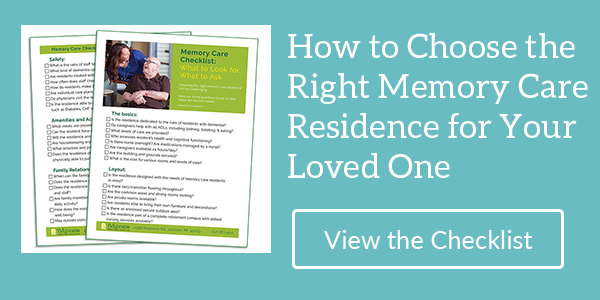
One of the first signs of dementia is the loss of normal communication abilities. It may begin slowly but as the symptoms persist, communication will become more difficult. Caregivers, friends and family of someone with dementia may become frustrated when they can’t make themselves understood, and the same is true for the person with dementia, especially in the very earliest stages. No matter what a person’s role is, being able to communicate with their friend or loved one with dementia can make a huge difference in their quality of life. Here are six tips for improving communication and avoiding frustrations.
1) One of the first communication challenges for someone with dementia is the loss of names of people, places and things. A person with dementia may be unable to tell who called or why, what they had for dinner last night, or even the dog’s name. This impedes normal communications and can be so frustrating the person may begin to limit conversation.
Caregivers and others can help fill in the missing information by suggesting possible names that make sense, reminding the person gently what they had for dinner, or pointing to the dog and speaking their name clearly. It is important not to remind the person that they have forgotten things or to raise your voice when responding. A calm and reassuring response will help the person far more than a critical one.
2) People with dementia are very sensitive to non-verbal communication so when words fail, it is important to remember communication can be accomplished in other ways.
For example, if you want the person to do something, try doing it yourself while making eye contact with them. Let’s say you want them to put on a jacket to go out for a walk, put your own on first and then hand them their own jacket. If you just want someone to feel calmer or less frustrated, you might touch them gently on the arm or give them a light hug. While doing so, always keep a smile on your face so they know you are there for them.
Also remember, negative body language like grouchy or angry facial expressions can be detrimental so try to be aware of your body language as much as your verbal language.
3) Since dementia robs people of recent memories but generally leaves older memories intact, spend time strengthening your relationship by recalling times gone by. Try paging slowly through family photo albums with the person, tell them about awards they may have received or special honors they are proud of, as well as family and friends. Photos from vacations, birthdays, anniversaries and other life events can help to keep old memories alive even as dementia steals yesterday. Try to entice the person to tell you the stories behind the pictures and help to fill in missing information if you can. Again, spend the time reminiscing quietly, use a calm and comforting voice and don’t chastise if they cannot recall a face or a name.
4) When asking questions that require an answer, keep it simple and limit possible answers. For example, don’t ask the person what they would like for lunch; instead ask if they would like a salad or a sandwich. Keep in mind the person’s ability to concentrate is limited so short sentences are preferable to long drawn out questions or explanations. It is also helpful if you resist the urge to treat them like a child, talk to them like you would a toddler or condescend. They are still adults and they will tune into a positive tone of voice much better than a negative one.
5) When communication becomes more difficult than normal, try reducing distractions before attempting to try again. Loud television and radio noise, sounds generated by traffic, law mowers, and other motorized equipment, even bright lights can impact people with dementia as they struggle to filter them out and sort out what they want to say.
Whenever possible, keep the person’s living environment distraction free or nearly free by keeping volumes down, shading bright lights and keeping windows closed to block road noises. Keep this in mind as well if you decide to go to a public place like a restaurant. Loud background music, combined with dozens of conversations, and people coming and going can literally overload the senses of a person with dementia. What might have been a nice meal out before dementia can become a nightmare of distraction after.
Also note that dementia makes people much more sensitive to sudden loud sounds that wouldn’t bother anyone else. Things like slamming doors, a loud dog barking or firecrackers going off can be very upsetting, causing overstimulation and agitation.
6) As dementia progresses, people begin to lose their familiarity with even their closest friends and relatives. This is one of the worst of all dementia symptoms and causes frustration for the person and utter sadness for those who love them. But there is a way to help keep names associated with faces: When someone comes to visit, always announce them to the person using their name and maybe even where the person knows them from.
For example, “Mom, look who stopped by, Barb Smith, your friend from church.” And don’t do this just for friends, do it for everyone from children and their spouses and kids to other relatives, every time they visit. Remember, people with dementia will probably do better visiting with people one-on-one rather than bringing a big group to visit.
Dementia is different in every person even though it has many common symptoms exhibited by almost all who have it. Always speak with your loved one’s physician when you have health-related concerns and questions. For more comprehensive information, consider reading another of our blog posts, "Memory Loss and Memory Care Guide." If you need assistance with short- or long-term care, contact Brightside Assisted Living & Memory Care. We're always here to help!

